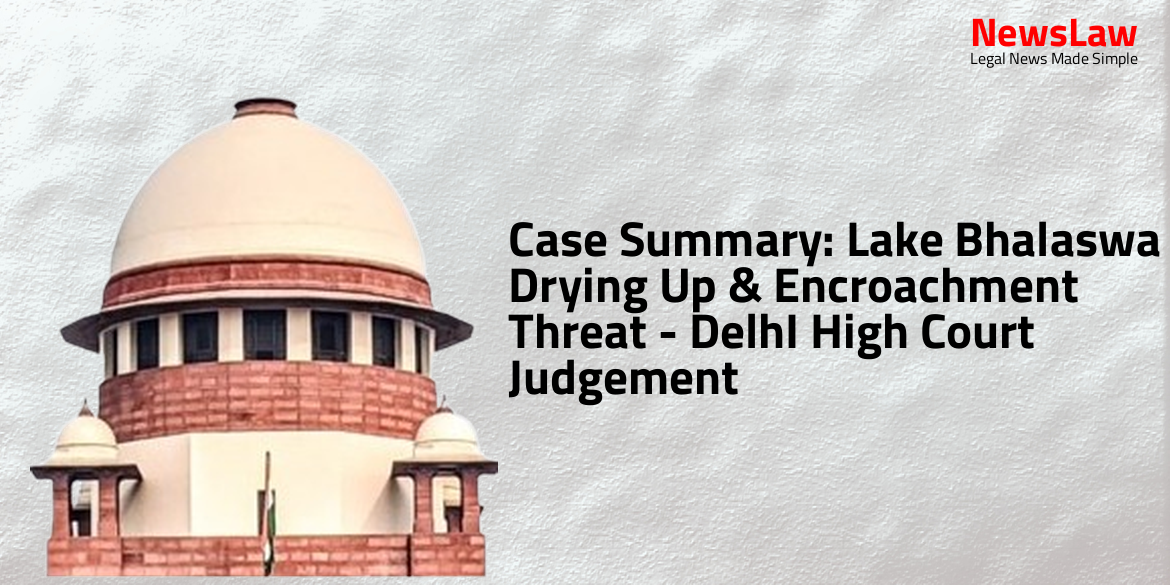Delve into the legal intricacies of Essentiality Certificates and the establishment of Medical Colleges as analyzed by the court in a recent case. The court’s considerations on adherence to time schedules, fulfillment of criteria, and the role of State Governments and Universities in granting approvals are crucial aspects of this analysis.
Facts
- Orders passed in Writ Petition No 34275 of 2019 and Writ Appeal No 2443 of 2019 were set aside by the Court.
- Three Writ Petitions were to be heard together and finally decided.
- Writ Petition No 27266 of 2019 was allowed, setting aside the State Government’s denial of NOC and EC for starting a new Medical College.
- The State Government was directed to issue/renew the EC of the appellant.
- Opportunity was given to apply for the Academic Year 2022-2023 instead of 2020-2021.
- The Review Petition filed by the appellant was dismissed.
- Writ Appeal filed by the State against the said order was dismissed by Division Bench.
- Decision about granting permission to start the Medical College for the Academic Year 2020-2021 was refused, with time-bound directions for inspection by the State and University for 2021-22.
- Various orders were passed directing the State Government, MCI, and Central Government in relation to EC and application of the appellant.
- Appeals arose out of the modified directions by the Division Bench of Kerala High Court for consideration of establishing a Medical College by the appellant for the Academic Year 2021-2022.
- Challenge was made to the finding that no relief could be granted for the Academic Session of 2020-2021 due to the prescribed time schedule being over.
- Appellant’s repeated attempts to establish a Medical College were hindered by actions of State Government and KUHS.
- Appellant’s hospital has necessary infrastructure for a Medical College.
- Several applications for EC and CoA were made by the appellant, many of which were rejected or not considered due to various issues like format discrepancies and time limits.
- Appellant’s appeal before the High Court and various petitions were either dismissed, stayed, or withdrawn.
- Various interim orders were issued, but final decisions on EC and CoA were not in favor of the appellant.
- Challenges and appeals were made regarding the renewal and revision of EC and CoA for different academic years.
- MCI and State Government’s actions led to rejection or return of appellant’s applications multiple times.
- Appellant faced challenges with the format and timing of EC and CoA submissions.
- Various Writ Petitions and Writ Appeals were filed by the appellant in the High Court regarding the establishment of the Medical College.
Also Read: Challenges with Dying Declarations in Legal Analysis
Issue
- Issue: Whether Essentiality Certificate (EC) and Consent of Affiliation (CoA) should be granted for the year 2020-2021 to the appellant.
- Appellant is a trust promoting education in Health and Medicine.
- Claimed to have set up a 300 bedded hospital in Walayar, Palakkad District in 2006.
Also Read: Promotion Dispute: Seniority-cum-Merit Principle
Arguments
- Establishment of a Medical College is governed by the MCI Act, and the University’s role is limited to granting affiliation.
- Essentiality Certificate for a new medical college is granted based on desirability and feasibility by the State Government.
- The State cannot withhold or withdraw the Essentiality Certificate once granted.
- The State Government must verify MCI norms are met by the appellant for setting up a new Medical College.
- The State cannot reject applications for establishing a Medical College based on policy grounds.
- Issuing an Essentiality Certificate is considered a ministerial job with limited purpose.
- Issues of fraud aside, the power to issue an Essentiality Certificate is considered exhausted once exercised.
- The appellant’s entitlement to the Certificate of Affiliation (CoA) is not automatic based on previous grants but subject to current evaluation.
- Faculty deficiency of 32%
- Tutor, Demonstrator-SR Deficiency of 78%
- Only 18 ICU Beds instead of required 60
- No Blood Bank in the hospital
- Lack of required laboratory facilities
- Outsourcing of most tests
- Doubtful genuineness of some patients for IP admission
- Inadequate documentation
- Provisional Affiliation granted in 2015 due to High Court order
- Failure to fulfill any requirements for medical college establishment
- Inspection in 2015 revealed lack of infrastructure and essential requirements
- Low bed occupancy of 24 out of 72 beds
- MCI Regulations and University statutes mandate fulfillment of essential requirements for CoA
- Recent inspection in 2020 found institution lacking requisite infrastructure
Also Read: Legal Analysis in Case of Assault Conviction Restoration
Analysis
- The Appellant Institution was found lacking proper facilities in inspections conducted in 2015 and 2020, necessitating the requirement of an Essentiality Certificate.
- The issuance of an Essentiality Certificate by the State Government is crucial before establishing a Medical College.
- The State Government, upon issuing an Essentiality Certificate, undertakes responsibilities in case the institution fails to meet requirements.
- The State Government has the power to revoke the Essentiality Certificate if deemed necessary.
- Grant of an Essentiality Certificate is not a simple ministerial act, but a significant certification ensuring the institution meets specific criteria.
- The State Government must conduct periodic inspections to ensure the maintenance of standards in professional colleges.
- Delay or failure in meeting requirements after receiving an Essentiality Certificate can lead to withdrawal of certification.
- The law allows the State Government to withdraw the Essentiality Certificate if granted fraudulently or if the basis for issuance no longer exists.
- Deficiencies in medical education would be detrimental to society
- Patients should not be used as objects for teaching by unequipped medical colleges
- Proper infrastructure and faculty are essential for medical education
- Half-baked doctors should not be allowed to practice
- The Medical Council of India should not leave loose or unqualified doctors to deal with patients
- Permission to admit students should not be granted conditionally
- Proper facilities, infrastructure, and adherence to teaching standards are necessary for medical colleges
- Orders related to new Medical Colleges should not ruin students’ careers
- Essentiality certificates can be withdrawn in cases of fraud or disappearance of reasons for granting them
- The act of issuing essentiality certificates is a quasi-judicial function
- Interference with decisions based on expert recommendations is permissible only in certain circumstances
- The establishment of a medical college requires prior permission from the Central Government by submitting a Scheme with specific conditions.
- Qualifying criteria include obtaining Essentiality Certificates from the State Government, consent of affiliation from a University, ownership and management of a hospital with at least 300 beds, and providing performance bank guarantees.
- The State Government must issue Essentiality Certificates indicating public interest and feasibility of establishing a medical college.
- The Council may seek additional information and conduct inspections to verify the applicant’s capabilities and infrastructure.
- Factors considered include offering minimum standards of medical education, financial resources, training arrangements for students, manpower requirements in the field of medicine, and other prescribed factors.
- State Government cannot be directed to issue EC or CoA to the appellant for the year 2020-2021 as the last date for the Academic Year 2021-2022 has already passed.
- The extended deadline of 15.12.2020 in view of the Covid-19 pandemic is also over.
- It is not possible to even notionally issue EC or CoA to the appellant for the previous year.
- The time schedule for starting a new Medical College for the year 2020-2021 has already lapsed.
Decision
- Appellant can apply for grant of EC and CoA for the next Academic Year after addressing deficiencies
- Time schedule for establishment of new Medical College must be strictly adhered to
- No order as to costs made
- Court emphasized adherence to time schedule for new Medical College establishments
- Appeals dismissed, relief not granted for Academic Year 2020-2021
Case Title: V.N. PUBLIC HEALTH AND EDUCATIONAL TRUST Vs. STATE OF KERALA AND ORS. ETC. (2021 INSC 117)
Case Number: C.A. No.-000703-000704 / 2021



